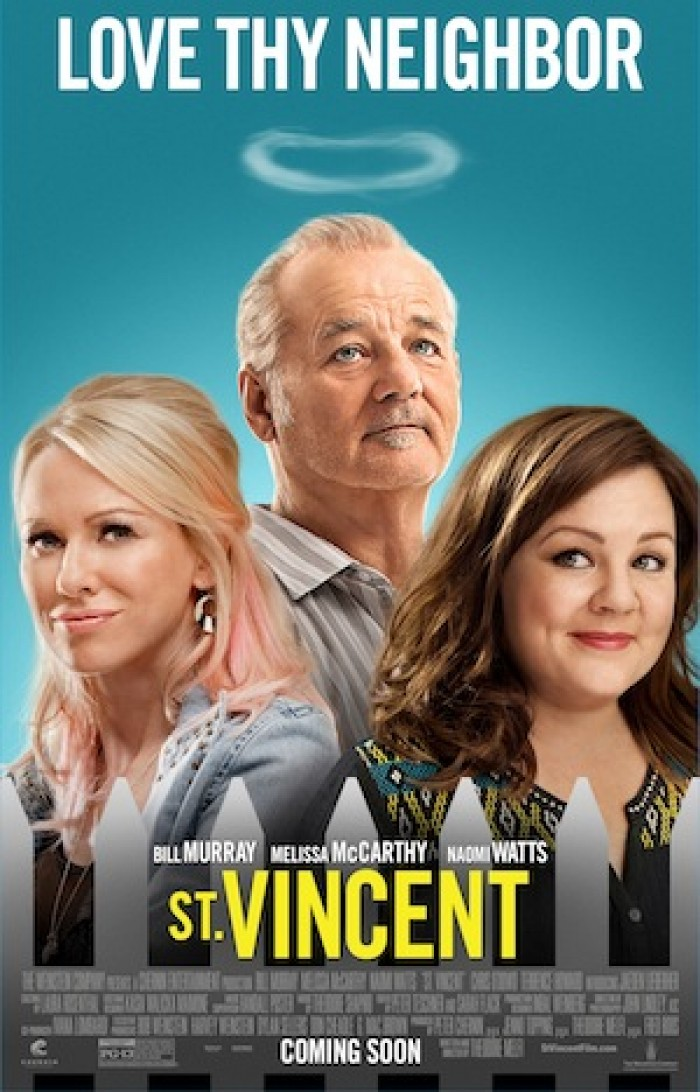“It is what it is”
The Toronto International Film Festival appears to be embracing the quasi-family friendly odd couple comedy with R-rated color after last year’s Bad Words and this year’s St. Vincent, written and directed by Theodore Melfi and currently receiving theatrical release a month after its debut. Whereas the former went all-in with f-words and curry-holes, however, the latter is intent on retaining a strong sense of sentimentality. This isn’t necessarily bad—it simply forces the film into a sort of limbo existence. Because despite its PG-13 rating, the cursing, subject matter, and overall prickly demeanor skews pretty high for most parents seeking clean, wholesome fun. And it’s over-arching message targeting audience members of young Oliver’s (Jaeden Lieberher) middle school age? Well, fans of Bad Words are going to find it overly cute and contrary to the humor’s otherwise adult tone.
This is a shame because it has the potential of being a success if only it chose one path over the other rather than toeing the line in between. It did win runner up status for TIFF’s People’s Choice Award, but I’m attributing the accolade to how tightly the festival embraced its “Bill Murray Day” gimmick and got everyone who came out to the premiere excited enough to vote for the film despite it being Murray himself that they wished to deem victor of the popularity contest. He’s great as the misanthropic Vietnam veteran up to his eyeballs in gambling debt and inebriated just shy of wrapping himself around a tree, though. Unfortunately, although his dynamic with Lieberher’s Oliver and the boy’s mother Maggie (Melissa McCarthy) does warrant your time, it’s not quite enough to forgive the film’s shortcomings.
St. Vincent may be Melfi’s second feature film, but it’s been fifteen years since that first made-for-TV entry. He’s done a few shorts since with The Beneficiary proving a pretty slick thriller of note, but you can’t help notice a lack of experience in finding consistency with his latest story. There’s a character in Terrence Howard‘s Zucko who adds stakes to Murray’s Vincent’s financial woes only to disappear along with his plot thread. Chris O’Dowd‘s “cool” Brother Geraghty arrives solely for quiet comic relief and to posit the film’s Saint-centered conceit which itself only presents during Act Three. And don’t get me started on Naomi Watts‘ pregnant Russian prostitute supplying one more unsavory person inside Vincent’s—and in turn Oliver’s—life for awkward laughs mostly stemming from her over-the-top fake accent.
It’s as though Melfi either didn’t trust his well-formed character drama between Vincent, Oliver, and Maggie or simply needed filler to expand everything out to its 103-minute runtime. Removing Howard’s Zucko and Watts’ Daka would lose nothing because we’ll understand Vincent’s poverty thanks to a nursing home threatening to ship his Alzheimer’s-ridden wife Sandy (Donna Mitchell) away and his charity from the love he keeps by visiting her each week with clean laundry. While it’s fun watching Vin help Daka during the career-killing situation a baby belly provides a sex worker, the whole ordeal only makes the film less palatable for children and not quite hysterical enough to bring more adults in to off-set losing the juvenile audience share. Trust me, Murray ensures he’s trashy and hedonistic enough without a bookie and hooker in tow.
All we need to understand the movie’s intentions is the ornery old man teaching a youngster skewed life lessons a la Walter Matthau in Bad News Bears and Billy Bob Thornton in Bad Santa dynamic that Melfi furnishes. He makes Oliver just precocious enough to call Vincent out on his shenanigans but not too much to fall into parody—something crucial for us to accept both of their evolutions by the end. McCarthy’s Maggie is perfectly painted as the single mother struggling to keep her son safe and educated while going through a divorce with a cheating husband and working long hours at her new job. The trio has a bit of everything: indifference, empathy, and frustration revolving between them until each comes to the rescue of the other whether they willingly acknowledge so now or later.
It’s cute to watch Oliver’s overly mature wimp take Vincent’s advice and make a friend in bully Ocinski (Dario Barosso) through fisticuffs. It’s cuter to see Murray’s blue-collar accent and defeated demeanor soften whenever he allows a little pride into his usual vitriol. Whether it’s laughing with Oliver at the track, smooth-talking nurses to use his insurance for Daka’s ultrasound, or the heart-breaking desperation to make Sandy smile, Vincent is deeply flawed and yet equally inspiring if you’re able to see past the walls he has erected against the world. His ways may be unorthodox and often illegal, but he’s never purposefully destructive to anyone but himself. He’ll verbally abuse and martyrs himself to “save” those he deems too good for him, but Melfi ensures we know the victims of his anger understand why.
If nothing else you will find yourself laughing thanks to the soulful performance underneath Murray’s dirt and bile. McCarthy and Lieberher nicely support him too with a restrained turn and acutely bright debut respectively. We feel for these three souls even when we find ourselves tiring of the caricatures around them and I only wish Melfi could have delved deeper into their interactions and progression. Murray is asked to do a lot of heavy lifting thanks to the multi-layered role and he excels despite a tragic illness I must admit ruined the pacing more than it enhanced the emotional undertones. Without this performance St. Vincent becomes another hollow attempt at poignancy masked by humor. With it we’re able to look past appearances and see the good intentions behind the crass excess.
Score: 6/10
Rating: PG-13 | Runtime: 103 minutes | Release Date: October 24th, 2014 (USA)
Studio: The Weinstein Company
Director(s): Theodore Melfi
Writer(s): Theodore Melfi

